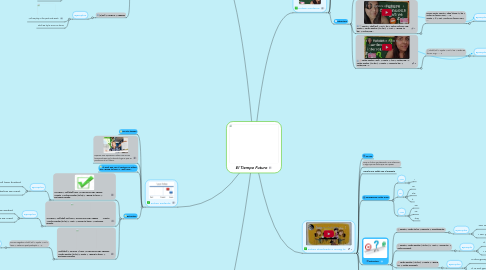
1. Futuro Simple
1.1. ¿Que es?
1.1.1. Son acciones a desarrollar en un futuro, sin necesidad de especificar cuándo.
1.2. Conjugación
1.2.1. Will
1.2.1.1. I
1.2.1.2. You
1.2.1.3. He
1.2.1.4. She
1.2.1.5. It
1.2.1.6. We
1.2.1.7. They
1.3. Contracciones
1.3.1. I'll, You'll He'll, She'll It'll, We'll, You'll, They'll
1.3.2. Cuando son negativas: Will not se contrae en "won't" y Shall not se contrae en "shan't"
1.4. Su estructura
1.4.1. (+) SUJETO + will/shall + VERBO
1.4.1.1. Ejemplos
1.4.1.1.1. She will [She’ll] arrive late.
1.4.1.1.2. I will [I’ll] call you tonight.
1.4.2. (-) SUJETO + will + not + VERBO
1.4.2.1. Ejemplos
1.4.2.1.1. She will not read the newspaper tomorrow.
1.4.2.1.2. He won’t live in Boston.
1.4.3. (?) will + SUJETO + VERBO?
1.4.3.1. Ejemplos
1.4.3.1.1. Will we play in the park next week
1.4.3.1.2. Shall we try to arrive on time?
2. Futuro Perfecto
2.1. En este tiempo
2.2. Expresa una suposición sobre una acción terminada que ya ha tenido lugar o que se producirá en un futuro.
2.3. Al igual que con el continuo Se utiliza con: “going to have” y "will have”.
2.4. Estructura
2.4.1. *SUJETO + will/shall have + PARTICIPIO DEL VERBO *Sujeto + verbos auxiliar (to be) + “going to have” + participio pasado.
2.4.1.1. Ejemplos
2.4.1.1.1. I shall have finished
2.4.1.1.2. I’ll [I’m going to] have eaten before we meet.
2.4.2. *SUJETO + will/shall not have + PARTICIPIO DEL VERBO *Sujeto + verbo auxiliar (to be) + “not” + “going to have” + participio pasado.
2.4.2.1. Ejemplos
2.4.2.1.1. You will not have worked
2.4.2.1.2. I won’t [I’m not going to] have eaten before we meet
2.4.3. *Will/shall + SUJETO + have + PARTICIPIO DEL VERBO? *Verbo auxiliar (to be) + sujeto + “going to have” + participio pasado?
2.4.3.1. Forma Negativa: Shall/Will + sujeto + not + have + verbo en past participle + ...?
2.4.3.1.1. Ejemplos
3. Fin de la Presentación
4. Futuro Continuo
4.1. Es aquel que;
4.2. Describe una acción que tendrá lugar en el futuro, puede especificarse o no, y seguirá desarrollándose en ese momento.
4.3. Conjugacion
4.3.1. Sujeto Auxiliares I will be /am going to be he, she, it will be/ is going to be you, we, they will be/ are going to be
4.4. Estructura
4.4.1. SUJETO + will be + VERBO CON TERMINACIÓN-ing. Sujeto + verbo auxiliar (to be) + “going to be” + verbo+ing.
4.4.1.1. Ejemplos
4.4.1.1.1. I shall/will be working. o I am going to be working.
4.4.1.1.2. They will be learning. o They’re going to be learning.
4.4.2. Sujeto + shall/will + not + be + verbo enforma -ing. Sujeto + verbo auxiliar (“to be”) + “not” + “going to be” + verbo+ing…
4.4.2.1. Forma corta; Sujeto + shan´t/won't + be + verbo en forma -ing + ... O Sujeto + 'll + not + verbo en forma -ing + ...
4.4.2.1.1. Ejemplos
4.4.3. Verbo auxiliar “will” + sujeto + "be"+ verbo+ing…? Verbo auxiliar (“to be”) + sujeto + “going to be” + verbo+ing…?
4.4.3.1. Shall/Will + sujeto + not + be + verbo en forma -ing + .... ?
4.4.3.1.1. Ejemplos
5. Futuro Planificado o Going to
5.1. Se Usa;
5.2. Para un futuro ya planeado, una intención, o algo que es obvio que va a pasar.
5.3. Vínculo muy sólido con el presente
5.4. Conjugación Verbo To Be
5.4.1. Am
5.4.1.1. I
5.4.2. Is
5.4.2.1. He
5.4.2.2. She
5.4.2.3. It
5.4.3. Are
5.4.3.1. You
5.4.3.2. We
5.4.3.3. They
5.5. Estructura
5.5.1. Sujeto + verbo to be + going to + complemento.
5.5.1.1. Ejemplos
5.5.1.1.1. You are going to pay
5.5.1.1.2. I am going to eat
5.5.2. Sujeto + verbo auxiliar ("to be") + "not" + "going to" + verbo principal.
5.5.2.1. Ejemplo
5.5.2.1.1. It is not going to rain
5.5.2.1.2. I am not going to eat tonight.
5.5.3. Verbo auxiliar ("to be") + sujeto + "going to" + verbo principal?
5.5.3.1. Ejemplos
5.5.3.1.1. Is she going to arrive late?
5.5.3.1.2. It is not going to rain
5.5.4. Construcción de la pasiva: Sujeto + am/are/is going to be +Participío
5.5.4.1. Ejemplo
5.5.4.1.1. he is going to be honored
5.6. Diferencia entre "going to" y "will"
5.6.1. Planificación y probabilidad de que suceda una acción
5.6.1.1. Se usa "going to" para planes concretos, cuando tenemos la seguridad de que algo va a suceder.
